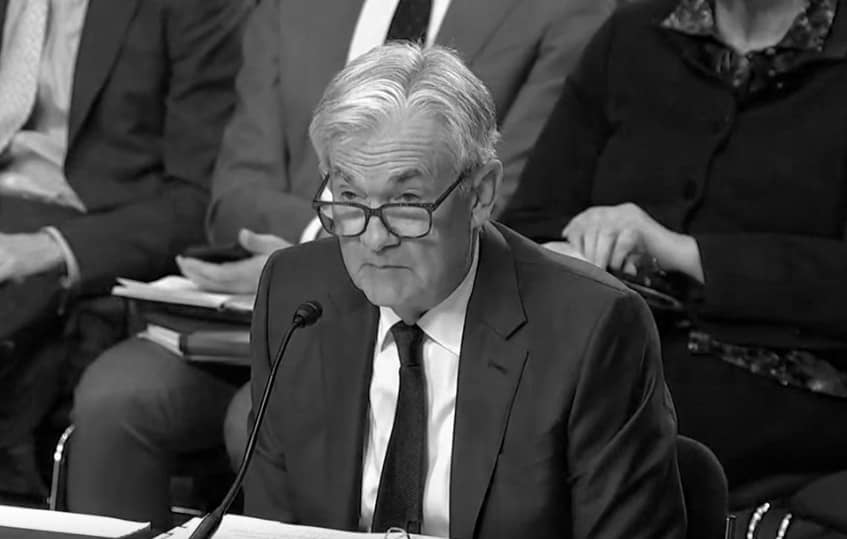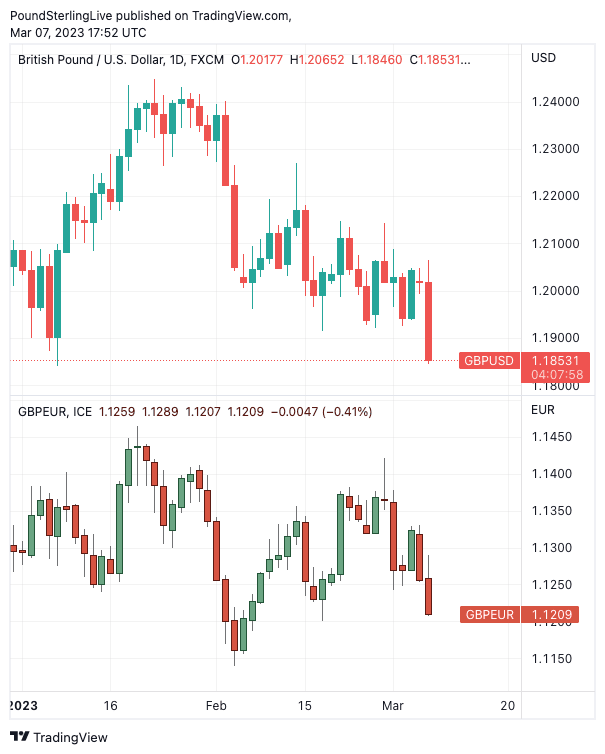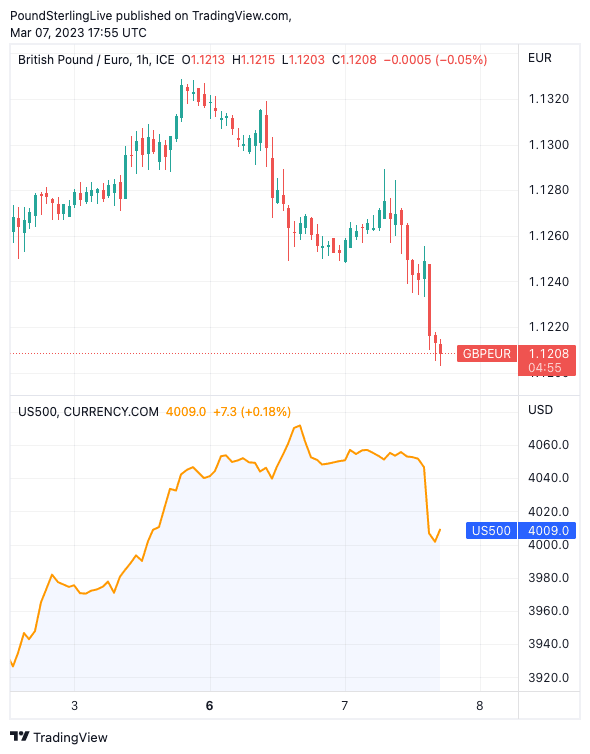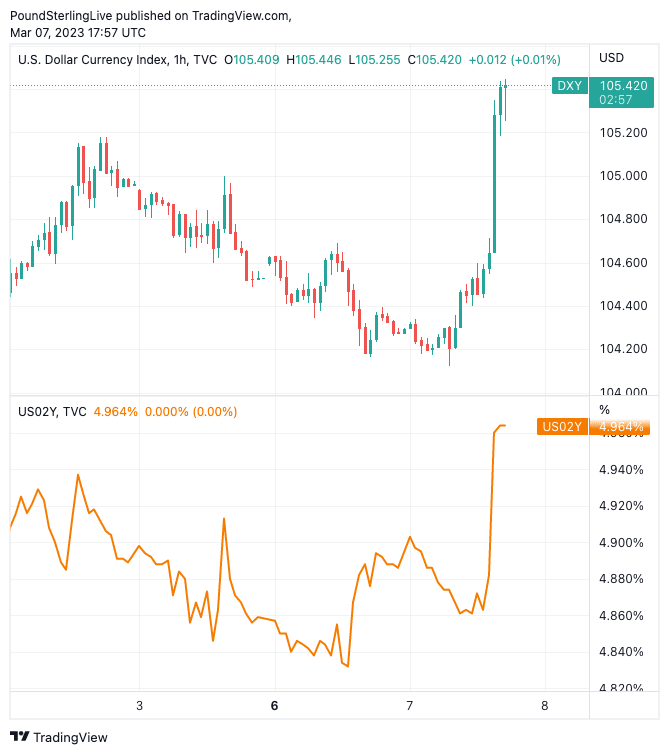Pound Sterling: Market Selloff and Growing Interest Rate Chasm sees Losses against Euro and Dollar Extend
- Written by: Gary Howes
- Powell warning on interest rates triggers market selloff
- Boosting USD & EUR against the GBP
- U.S. Fed and ECB are committed to further rate hikes
- The BoE isn't, penalising GBP
- BoE's Mann warns of potential for further GBP losses

Above: Powell testifies before Congress on March 07. Image: Pound Sterling Live, source: Reuters.
The British Pound lost notable ground against the Dollar and slid against the Euro, Yen and Franc following comments made by the head of the U.S. central bank that indicated interest rates in the world's largest economy would be going higher than previously expected.
The Dollar soared across the board, U.S. short-term bond yields spiked and stocks slumped after Federal Reserve Chair Jerome Powell said interest rates are Going to "higher than anticipated" levels.
Speaking to members of the U.S. Congress during a regular committee testimony Powell said "the latest economic data have come in stronger than expected, which suggests that the ultimate level of interest rates is likely to be higher than previously anticipated."
Interest rates in the U.S. and other global markets rose as investors priced in higher Federal Reserve rates, which acts as a drag on stocks.
The negative investor environment meanwhile weighs on 'high beta' currencies such as the Pound which tends to struggle when investors are acting defensively.
But the developments also underscored a growing chasm between the outlook for Bank of England interest rates and those of the U.S. Federal Reserve and the European Central Bank, with the former likely to hike less than its two larger rivals.
The Pound to Dollar exchange rate fell by 1.30% in the minutes following Powell's comments to quote at 1.1870, its lowest level since January.
The Pound to Euro exchange rate slipped by a third of a percent to quote at 1.1220.
Compare Currency Exchange Rates
Find out how much you could save on your international transfer
Estimated saving compared to high street banks:
£2,500.00
Free • No obligation • Takes 2 minutes
The size of the FX movements, when combined with Powell's messaging, suggests the market could be reentering a trend of USD appreciation until such a time as inflation and data turn south once more.
This implies further downside potential for both GBP/USD and GBP/EUR. (If you are looking to protect or boost your international payment budget you could consider securing today's rate for use in the future, or set an order for your ideal rate when it is achieved, more information can be found here.)
"Powell’s hawkish masterclass has sent the Greenback skyrocketing as institutional investors start parking funds in the Dollar to capitalise on sustained interest rate rises. America’s battle against inflation is far from over, and with the Fed flexing its monetary muscles in response, the Dollar has been the big beneficiary," says Samuel Fuller, Director of Financial Markets Online.
Above: GBP/USD (top) and GBP/EUR at daily intervals showing a 2023 loss for both pairs. Consider setting a free FX rate alert here to better time your payment requirements.
Powell's testimony follows a spate of better-than-expected U.S. economic data prints that suggest the Fed must do more to cool the economy and curb inflation.
As a result, Powell said he is prepared to increase the pace of rate hikes if needed.
In response to the testimony, Fed Funds futures showed investors were now pricing in a 50 basis point hike for March, up from 25bp previously.
U.S. short-term bond yields rose in response.
The Dollar fell through the latter part of 2022 and into 2023 as markets raised bets the Fed was close to completing its rate hiking cycle.
The cost of money in the U.S. meanwhile fell as financial markets started to price in rate cuts from the middle of 2023 onwards.
But this dynamic has been overturned by stronger-than-expected economic data prints in February, all of which point to persistent inflationary pressures.
"If the totality of the data were to indicate that faster tightening is warranted, we would be prepared to increase the pace of rate hikes," said Powell.
Above: GBP/EUR (top) is tracking the U.S. S&P 500 stock index closely once more, confirming global investor sentiment is of importance.
U.S. two-year yields jump to almost 5% following the remarks, suggesting markets are starting to believe the Fed is prepared to do enough to slow the economy and bring inflation lower.
The Pound has meanwhile been cast adrift by its own central bank which shows little inclination to raise interest rates much further than the current 4.0%.
This is despite UK data also picking up in February, raising the prospect of elevated inflation levels that would defy Bank of England forecasts for a rapid fall in UK inflation in 2023.
Indeed, UK mortgage rates have now fallen enough over recent weeks for house prices to start picking up again, according to the latest Halifax data.
The Bank of England's reluctance to take interest rates much higher leaves the Pound exposed to weakness, according to Catherine Mann, who sits on the Bank's rate-setting committee.
Mann said in an interview on Tuesday that Sterling risked further losses if markets had not fully 'priced in' the hawkish message coming from the Federal Reserve and European Central Bank.
"The important question for me with regard to the Pound is how much of that existing hawkish tone is already priced into the Pound," she said.
Above: The Dollar index spikes, drawn higher by U.S. two-year bond yields (bottom pane), confirming the bond market is driving FX markets.
The Federal Reserve and European Central Bank are expected by investors to continue raising interest rates amidst elevated inflation levels in the Eurozone and U.S.
The Bank of England is meanwhile expected by economists to end its hike cycle in March, despite the UK facing a similar level of inflation as the Eurozone and U.S.
Mann said if the divergence in expectations is "already priced in, then what we see is what we get. But if it's not completely priced in, then there could be depreciation pressure."
Money markets show investors expect a further ~80 basis points of rate hikes to come from the Bank of England, suggesting they believe the Bank will be forced into hiking beyond March.
But if the Bank is intent on making March its final hike then markets will adjust expectations accordingly, potentially heaping pressure on the Pound.
"Benign monetary policy will weigh on the pound," says a weekly currency briefing from Barclays.
Barclays says the Pound will struggle as investors encounter a "still dovish Bank of England" and "significant and persistent inflation in the UK".
Mann said other central banks had meanwhile "been talking hawkish for a while but I think perhaps there's more to go."
Judging by Powell's comments and the market's reaction, she was right.
She could also be right in warning that a fall in the Pound would negatively impact the Bank's fight against inflation and that the currency is therefore something the Bank of England should consider when setting policy.
So far her warnings have gone unheaded by a Bank of England crowded by 'doves' and intent on doing the absolute minimum in raising interest rates when fighting inflation.
The Pound will likely experience further declines as a consequence.







